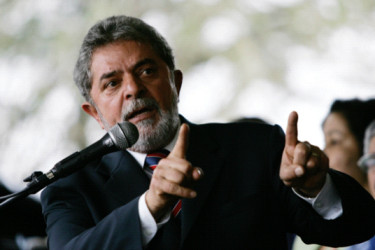BRASILIA, (Reuters) – Police are seeking permission to question former Brazilian President Luiz Inacio Lula da Silva in a political kickback scheme, the country’s Supreme Court said, in the sharpest sign yet that the popular politician could be dragged into the widening scandal.

According to a motion filed with the court, federal police suspect the former president “may have benefited” from a political kickback scheme at state-run oil company Petroleo Brasileiro SA, or Petrobras.
Lula may have “secured advantages for himself, for his party … or for his government by maintaining a base of political support sustained by illicit business” at the company, investigators wrote in the motion.
The request adds further fuel to a crisis that has already undermined support for President Dilma Rousseff, Lula’s successor, his former energy minister and chairwoman of Petrobras at the time much of the graft took place.
The former president, approached by reporters while on a visit to Argentina, said he had not been notified of the request. A spokesman in Brazil declined to comment further.
The request was made to the Supreme Court because the case, which has already ensnared Lula’s former chief of staff and dozens of other political and corporate chieftains, also has led to charges against sitting officials, including the speaker of the lower house of Congress.
Under Brazilian law, the Supreme Court is the only venue authorized to try elected federal officials. The court is expected to rule on the federal police request within a week.
In the motion, investigators said it was necessary to question Lula because the probe, and evidence obtained in plea bargain testimony from officials already convicted in the scandal, “reaches the political and partisan nucleus of his government.”
So far, prosecutors have said that no evidence exists tying Lula or Rousseff to any crimes.
The investigation is focused on billions of dollars in kickbacks paid to some of the oil company’s executives, ruling party officials and others in exchange for business contracts and political support.







